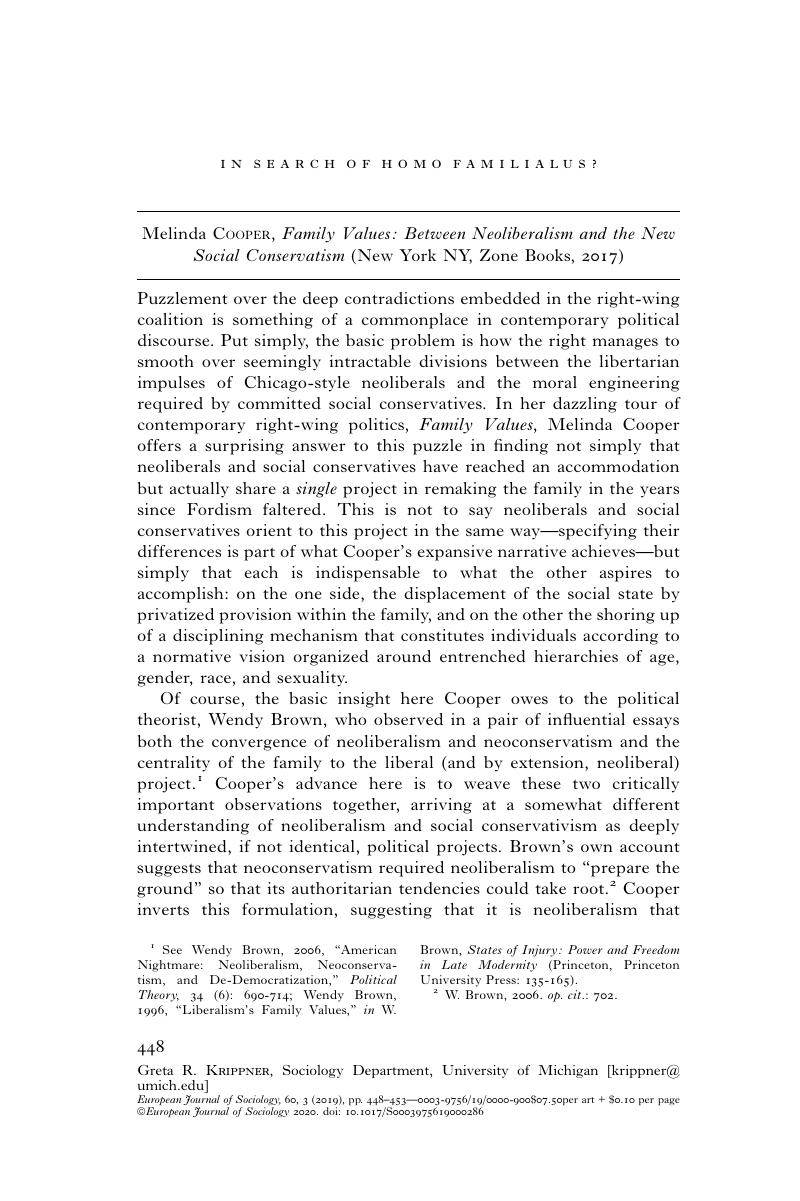No CrossRef data available.
Article contents
In Search of Homo Familialus? - Melinda Cooper, Family Values: Between Neoliberalism and the New Social Conservatism (New York NY, Zone Books, 2017)
Published online by Cambridge University Press: 14 February 2020
Abstract

- Type
- Book Reviews
- Information
- European Journal of Sociology / Archives Européennes de Sociologie , Volume 60 , Issue 3 , December 2019 , pp. 448 - 453
- Copyright
- Copyright © A.E.S. 2020
References
1 See Wendy Brown, 2006, “American Nightmare: Neoliberalism, Neoconservatism, and De-Democratization,” Political Theory, 34 (6): 690-714; Wendy Brown, 1996, “Liberalism’s Family Values,” in W. Brown, States of Injury: Power and Freedom in Late Modernity (Princeton, Princeton University Press: 135-165).
2 W. Brown, 2006. op. cit.: 702.
3 For variations on this theme, see Colin Crouch, 2011, “Privatized Keynesianism: Debt in Place of Discipline,” in C. Crouch, The Strange Non-Death of Neoliberalism (Cambridge UK, Polity Press: 97-124); Greta R. Krippner, 2011, Capitalizing on Crisis: The Political Origins of the Rise of Finance (Cambridge MA, Harvard University Press); Wolfgang Streeck, 2012, Buying Time: The Delayed Crisis of Democratic Capitalism (New York, Verso Press); Sarah L. Quinn, 2019, American Bonds: How Credit Markets Shaped a Nation (Princeton, Princeton University Press).
4 Cooper actually goes further than this, suggesting that insofar as these left critics identify the neoliberal erosion of the family wage as the problem, their implicit remedy is the restoration of the Fordist family. But Cooper’s logic here is faulty: it is possible to be critical of neoliberalism’s destabilization of the family (and even to note the paradoxical contributions of feminism to this outcome) without necessarily wishing to return to an era in which the “price” of social protection from the market was women’s subordination within the family.
5 Fraser’s argument is actually broader than this suggests, as she is concerned with the “social” writ large (including, of course, the family). See Nancy Fraser, 2013, “Between Marketization and Social Protection: Resolving the Feminist Ambivalence,” in N. Fraser, Fortunes of Feminism: From State-Managed Capitalism to Neoliberal Crisis (New York, Verso Press: 227-241).
6 My thinking here owes a significant debt to James Ferguson’s writings on neoliberalism. See especially James Ferguson, 2009, “The Uses of Neoliberalism,” Antipode, 41 (S1): 166-184.


